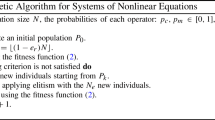Abstract
Research on evolutionary theory and statistic physics has provided computer scientists with powerful methods for designing intelligent computational algorithms, such as simulated annealing, genetic algorithm, extremal optimization, etc. These techniques have been successfully applied to a variety of scientific and engineering optimization problems. However, these methodologies only dwell on the macroscopic behaviors (i.e., the global fitness of solutions) and never unveil the microscopic mechanisms of hard computational systems. Inspired by Richard Dawkins’s notion of the “selfish gene”, the paper explores a novel evolutionary computational methodology for finding high-quality solutions to hard computational systems. This method, called gene optimization, successively eliminates extremely undesirable components of sub-optimal solutions based on the local fitness of genes. A near-optimal solution can be quickly obtained by the self-organized evolutionary processes of computational systems. Simulations and comparisons based on the typical NP-complete traveling salesman problem demonstrate the effectiveness and efficiency of the proposed intelligent computational method.
Preview
Unable to display preview. Download preview PDF.
Similar content being viewed by others
References
Farhi, E., Goldstone, J., Gutmann, S., Lapan, J., Lundgren, A., Preda, D.: A Quantum Adiabatic Evolution Algorithm Applied to Random Instances of an NP-Complete Problem. Science 292, 472–476 (2001)
Gutin, G., Punnen, A.P. (eds.): The Traveling Salesman Problem and Its Variations. Kluwer Academic Publishers, Boston (2002)
Kirkpatrick, S., Gelatt Jr., C.D., Vecchi, M.P.: Optimization by simulated annealing. Science 220(4598), 671–680 (1983)
Forrest, S.: Genetic algorithms: principles of natural selection applied to computation. Science 261(5123), 872–878 (1993)
Boettcher, S.: Extremal optimization: heuristics via co-evolutionary avalanches. Computing in Science and Engineering 2, 75–82 (2000)
Dawkins, R.: The Selfish Gene, 2nd edn. Oxford University Press, Oxford (1989)
Heylighen, F.: Evolution, Selfishness and Cooperation. Journal of Ideas 2(4), 70–76 (1989)
Bar-Yam, Y.: Formalizing the gene centered view of evolution. Advances in Complex Systems 2, 277–281 (2000)
Bak, P., Sneppen, K.: Punctuated Equilibrium and Criticality in a Simple Model of Evolution. Physical Review Letters 71(24), 4083–4086 (1993)
Visscher, P.K.: How self-organization evolves. Nature 421, 799–800 (2003)
Sperber, D.: Evolution of the selfish gene. Nature 441, 151–152 (2006)
Gabrielli, A., Cafiero, R., Marsili, M., Pietronero, L.: Theory of self-organized criticality for problems with extremal dynamics. Europhysics Letters 38, 491–491 (1997)
Pepper, J.W., Hoelzer, G.: Unveiling Mechanisms of Collective Behavior. Science 294, 1466–1467 (2001)
Boettcher, S., Percus, A.G.: Nature’s way of optimizing. Artificial Intelligence 119, 275–286 (2000)
Back, T., Fogel, D.B., Michalewicz, Z. (eds.): Handbook of Evolutionary Computation. IOP Publishing Ltd and Oxford University Press (1997)
Okano, H., Misono, S., Iwano, K.: New TSP Construction Heuristics and Their Relationships to the 2-Opt. Journal of Heuristics 5, 71–88 (1999)
Reinelt, G.: TSPLIB-a traveling salesman problem library. ORSA Journal on Computing 3(4), 376–384 (1991)
Michalewicz, Z.: Genetic Algorithms + Data Structures = Evolution Programs. Springer, London (1996)
Potvin, J.Y.: Genetic algorithms for the traveling salesman problem. Annals of Operations Research 63, 339–370 (1996)
Author information
Authors and Affiliations
Editor information
Rights and permissions
Copyright information
© 2007 Springer-Verlag Berlin Heidelberg
About this paper
Cite this paper
Chen, YW., Lu, YZ. (2007). Gene Optimization: Computational Intelligence from the Natures and Micro-mechanisms of Hard Computational Systems. In: Li, K., Fei, M., Irwin, G.W., Ma, S. (eds) Bio-Inspired Computational Intelligence and Applications. LSMS 2007. Lecture Notes in Computer Science, vol 4688. Springer, Berlin, Heidelberg. https://doi.org/10.1007/978-3-540-74769-7_21
Download citation
DOI: https://doi.org/10.1007/978-3-540-74769-7_21
Publisher Name: Springer, Berlin, Heidelberg
Print ISBN: 978-3-540-74768-0
Online ISBN: 978-3-540-74769-7
eBook Packages: Computer ScienceComputer Science (R0)




